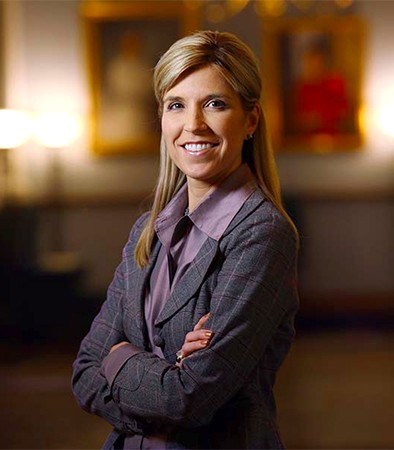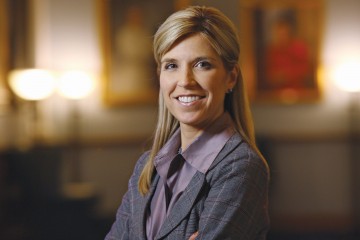
Image caption: Redonda Miller
Image credit: Keith Weller
Redonda Miller, who was recently named the 11th president and first woman to helm the Johns Hopkins Hospital, came to Johns Hopkins for medical school in 1988 and never left.
After graduating and completing residency training, Miller served in many leadership positions, including assistant dean for student affairs for the School of Medicine, vice chair of clinical operations for the Department of Medicine, and senior vice president for medical affairs for the Johns Hopkins Health System.
Miller's appointment has made a stir in the medical community, and she said she has received multiple invitations to speak at events.
"People are excited about a woman being president," Miller says. Only 18 percent of hospital chief executives are female, according to a 2013 report from Rock Health.
Miller, 49, recently spoke with Johns Hopkins Medicine's Dome about her favorite Johns Hopkins memory, how she spends her free time, and her plans to make "near perfection" even better.
You belong to an elite club—one of just 11 presidents of the Johns Hopkins Hospital. What does that legacy mean to you?
First of all, I'm very honored. I remember celebrating the 100-year anniversary of the Johns Hopkins Hospital during my second year in medical school. I never would have guessed that I would be president.
You've been at Johns Hopkins for 28 years. Why have you stayed?
When I matriculated to medical school, my intent was to go back to Ohio and practice cardiology or oncology in my hometown of Wheelersburg. At every transition point, whether it was picking a residency or choosing where to start my faculty career, I would find myself asking, "Why would I leave when I'm already at the best place?" And there was my answer.
Video credit: Johns Hopkins Medicine
There is a universal drive for excellence among everyone. But more importantly, that drive for excellence occurs in a setting of collegiality. Other places may have one or the other but not both.
What do you like to do when you're not at work?
My spare time is devoted to being "mommy" to our two daughters (Francesca, 11, and Bianca, 7). My bosses are supportive of family. They encourage me to go to all the important events, which I try to do. I may not make it to every rehearsal, but I see the school play. I love to travel with the family, and I watch a lot of Ohio State Buckeyes football.
What is one of your best Johns Hopkins memories?
My favorite memory is meeting my husband (Albert Polito, pulmonary medicine chief at Mercy Medical Center). I was an internal medicine resident, and he was a pulmonary fellow. We were on the same medical intensive care unit team, and the rest is history.
What was one of your biggest challenges?
In 2009, just three or four weeks after I became vice president of medical affairs, we had an unexpected Joint Commission visit. We were cited for not having a process to provide professional practice evaluations for medical staff. We had 60 days to develop a peer review program for roughly 2,500 physicians. I remember the entire team pitching in to meet this requirement. It was such a collaborative effort.
You have said you plan to continue clinical practice. Why?
Seeing patients will keep me grounded and help me remember why I'm here. It will also better inform any decisions I need to make.
What are some of your goals as hospital president?
We have amazing people, and our institution is world-renowned. It may seem difficult to improve on near perfection, but we can always find areas in which we can do better. I would like us to focus more on the patient experience. Our patients already receive the highest quality of care. I want to make sure every aspect of their experience is a good one.
Another goal is to ensure that both our front-line providers and nonclinical staff members know how much they are valued and appreciated. The employees are really what make Johns Hopkins great.
Finally, I want to continue building on the good work that's being done in our community, particularly after last year's unrest. Baltimore is our home. Providing training programs and jobs is an essential step toward economic advancement.
Posted in Health, Voices+Opinion
Tagged johns hopkins hospital, redonda miller








